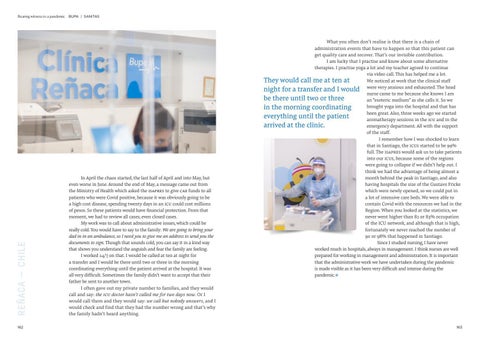REÑACA — CHILE
Bearing witness to a pandemic BUPA | SANITAS
162
In April the chaos started, the last half of April and into May, but even worse in June. Around the end of May, a message came out from the Ministry of Health which asked the isapres to give cae funds to all patients who were Covid positive, because it was obviously going to be a high cost disease, spending twenty days in an icu could cost millions of pesos. So these patients would have financial protection. From that moment, we had to review all cases, even closed cases. My work was to call about administrative issues, which could be really cold. You would have to say to the family: We are going to bring your dad in in an ambulance, so I need you to give me an address to send you the documents to sign. Though that sounds cold, you can say it in a kind way that shows you understand the anguish and fear the family are feeling. I worked 24/7 on that. I would be called at ten at night for a transfer and I would be there until two or three in the morning coordinating everything until the patient arrived at the hospital. It was all very difficult. Sometimes the family didn’t want to accept that their father be sent to another town. I often gave out my private number to families, and they would call and say: the icu doctor hasn’t called me for two days now. Or I would call them and they would say: we call but nobody answers, and I would check and find that they had the number wrong and that’s why the family hadn’t heard anything.
What you often don’t realise is that there is a chain of administration events that have to happen so that this patient can get quality care and recover. That’s our invisible contribution. I am lucky that I practise and know about some alternative therapies. I practise yoga a lot and my teacher agreed to continue via video call. This has helped me a lot. They would call me at ten at We noticed at work that the clinical staff night for a transfer and I would were very anxious and exhausted. The head nurse came to me because she knows I am be there until two or three an “esoteric medium” as she calls it. So we brought yoga into the hospital and that has in the morning coordinating been great. Also, three weeks ago we started everything until the patient aromatherapy sessions in the icu and in the arrived at the clinic. emergency department. All with the support of the staff. I remember how I was shocked to learn that in Santiago, the icus started to be 99% full. The isapres would ask us to take patients into our icus, because some of the regions were going to collapse if we didn’t help out. I think we had the advantage of being almost a month behind the peak in Santiago, and also having hospitals the size of the Gustavo Fricke which were newly opened, so we could put in a lot of intensive care beds. We were able to contain Covid with the resources we had in the Region. When you looked at the statistics, we never went higher than 82 or 83% occupation of the ICU network, and although that is high, fortunately we never reached the number of 90 or 98% that happened in Santiago. Since I studied nursing, I have never worked much in hospitals, always in management. I think nurses are well prepared for working in management and administration. It is important that the administrative work we have undertaken during the pandemic is made visible as it has been very difficult and intense during the pandemic.�
163































